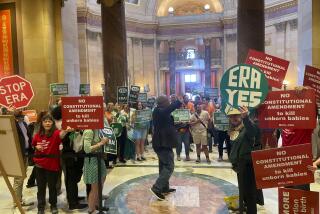Officeholders will raise right hands, and a ruckus
- Share via
The city of Madison, Wis., swears in hundreds of elected and appointed officials in an annual ritual each April.
This year, many may turn their oaths of office into a political protest.
In a move that has raised concern on the left and the right, the City Council this week voted to let officeholders announce they are taking the oath under protest because they deplore a constitutional amendment banning same-sex marriage.
After swearing to uphold the state constitution, officeholders will be allowed to add that, in their view, the gay-marriage amendment “besmirches” that document. “I pledge to work to eliminate this section from the constitution,” the protest statement reads, “and work to prevent any discriminatory impacts from its application.”
Madison Mayor David J. Cieslewicz called the statement a fair way to resolve a “crisis of conscience” in his famously liberal city. “Many of us felt that we couldn’t, in good conscience, swear allegiance to a state constitution that openly discriminated against gays and lesbians,” he said.
Making a political statement after an oath of office is not a novel idea, he added: “Politicians do it all the time. It’s called an inauguration speech.”
But critics said they were troubled by what they considered a pledge -- en masse -- to undermine the laws of the land the officeholders had only moments earlier sworn to uphold.
“This is a trashing of democracy,” said Julaine K. Appling, chief executive of the nonprofit Family Research Institute of Wisconsin, a conservative advocacy group. “Officeholders have to uphold the constitution. They don’t get to pick and choose.”
The ban on same-sex marriage and civil unions passed overwhelmingly last fall, with support from 59% of Wisconsin voters.
Political scientist Howard Schweber voted against the amendment; he considers it unfair, even illegal. Yet he does not approve of appending a protest to the oath of office.
“Consider how it would feel having a segregationist in a Southern state protesting Brown vs. the Board of Education while taking the oath of office,” said Schweber, who teaches at the University of Wisconsin-Madison. “Or imagine any county sheriff saying: ‘Here are the laws I will enforce. Here are the ones I won’t. And here are the ones I’ll enforce in name but do everything I can to limit the effect of.’ ”
It is unclear how many elected politicians or appointed members of city panels will add the protest to their oath. (They can recite it or sign a copy.)
“We’ll find out,” said Councilwoman Brenda Konkel, who supports the protest, “when we have our swearing-in ceremony.”
*
More to Read
Sign up for Essential California
The most important California stories and recommendations in your inbox every morning.
You may occasionally receive promotional content from the Los Angeles Times.










